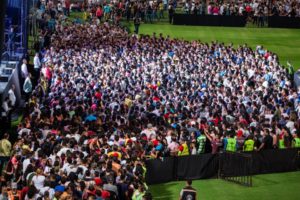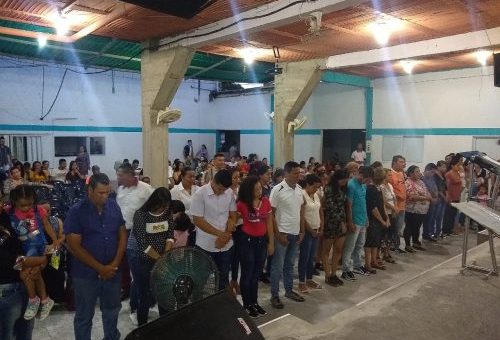On the last Sunday in April, a pastor in Cúcuta, Colombia, was shocked to see his church at capacity. It wasn’t a one-time phenomenon, either; his church has since added an additional service to accommodate the crowd.
He really shouldn’t have been taken aback, he said several weeks later. After all, it’s what he’d been praying for—more people seeking Christ. And he wasn’t alone in those prayers.
For months leading up to Franklin Graham’s Festival de Esperanza (Festival of Hope) in Cúcuta, more than 300 local churches prayed and invited people to come.
Pastor Mario Diaz Ayala was one of them. He knew this was going to be an unprecedented event for his city, which sits on the border of Venezuela. The area has faced—and still faces—severe economic uncertainty on both sides of the border.
Pastor Mario served on the Festival’s leadership team and had everyone in his church inviting people to hear Franklin Graham preach at a massive soccer stadium. Church members went door to door, handing out flyers. Pastor Mario helped organize 12 of the hundreds of busloads of people who came, and others in the church used their own cars to drive people to the event.
In the two days before Easter, more than 94,000 people heard the Gospel, plus another 22,000 who attended a kid-centric evangelistic program called FestiKids earlier in the week.
“It was amazing—an incredible opportunity for this city,” Pastor Mario said.

But any church that’s been involved in a Festival knows that’s not where it ends. What happens after people decide to start a life with Christ? Where do they go once the event is over and the venue clears out?
At every evangelistic event, Franklin Graham encourages new believers to go to church where they can grow in their faith. But it’s not just a recommendation; there are people on the ground to be sure each new Christian is connected with a church nearby.
That’s where people like Pastor Mario come in. More than 50 new people showed up at his church the Sunday after the Festival.
“We were surprised by the Lord,” he said. “The people don’t fit. There are too many people.”
And they keep coming—some who didn’t even go to the Festival.
Not that that’s a bad thing.
Before the Festival, Pastor Mario said his church had 170 members. Now it’s 250 on Sunday morning and another 250 on Sunday afternoon. His church also added a Saturday service specifically for new Christians, around 50 to 70 people.
Right now, his church is made up of three small houses situated next to each other, with no walls between. He’d like to buy a fourth house to expand the building.
It’s not all up to him to care for the new faces, though. He’s mobilized his entire church to help disciple new Christians and teach them the basics of Christianity.
Church growth has sparked a fresh wave of prayer, too. There are 15 new prayer groups just for new believers.
Another kicker: his church isn’t the only one. He knows other pastors desiring larger church spaces since the Festival because more people are showing up on the weekends.

